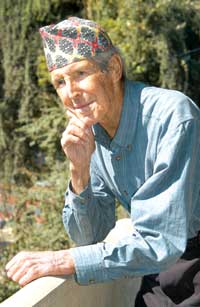 Even those who don't personally know Father Eugene Watrin will recognise him as the priest on the bicycle on Kathmandu streets. Until last year, there was no slowing down this 82-year-young Jesuit. Rain or shine, day or night, Watrin would be pedaling away on the Tripureswor uphill without getting off.
Even those who don't personally know Father Eugene Watrin will recognise him as the priest on the bicycle on Kathmandu streets. Until last year, there was no slowing down this 82-year-young Jesuit. Rain or shine, day or night, Watrin would be pedaling away on the Tripureswor uphill without getting off. It's a long way from Dayton, Ohio, where Watrin was born and raised till he joined the Jesuit order at 19. He knew it meant he could never marry, committing his whole life to the service and severing ties with parents, sisters and younger brother. Though the Vatican later changed the rules, it would be 21 years of living halfway across the globe before Watrin met his family again.
After nine years in India, Watrin was delighted when offered the chance of teaching in Nepal. In 1955, he began as hostel prefect at St Xavier's Godavari School and taught English language, literature and biology to many boys who are now movers and shakers in the land.
When he became principal in 1962, Watrin secured the property at Tara Mahal in Jawalakhel for primary day students. "You can't just give an education, it's more of a cooperative effort between teachers, students and parents," says Watrin who believes in an all-round education that empasises sports, hiking and community service.
No wonder there was something different about 'Godavarians': graduates of St Xavier's. Almost as soon as the first students finished school, Watrin established the Godavari Alumni Association (GAA) so the boys (and later, girl members) could contribute to society through social service. Worried about his former students having to go abroad to college, Watrin set up St Xavier's College in Thapathali in 1988.
Last year, Watrin was diagnosed with cancer of the pancreas. His doctor advised return to the US where he was told the disease had progressed too far to operate and chemotherapy was the only recourse. Watrin found the treatment is available here, and that was all the excuse he needed to return to Nepal. Last week, doctors were surprised to find the cancer had all but disappeared and attributed it to Watrin's spiritual strength and tenacity.
Later this month, Watrin will receive the Gorkha Dakshin Bahu from King Gyanendra for his lifelong service to Nepal. But as one of his students recognises: "Father Watrin does not seek applause, in a place where so much is done for effect." His work has not ended, and Watrin says he still has two or three projects he wants to start.
Watrin is now back on his bicycle, and asked whether it's such a good idea, his clear blue eyes widen: "God's will is my will. It's kind of my karma to accept what God has put before me." So, we'll be seeing more of the good padre negotiating traffic. (Sraddha Basnyat)


